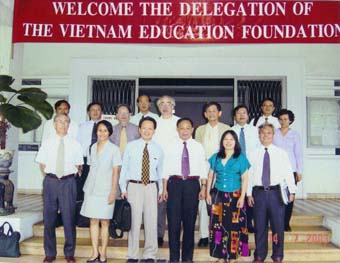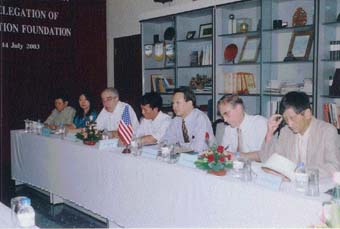Personal tools
News from ICTP 106 - Features - Vietnam

Le Dung Trang recently returned to Vietnam. His mission: To help repair the long-severed ties between the United States and his home country.
Reconciliation through Science
The images are imprinted into
history books around the world: Snapshots of desperate people
stranded on the rooftop of the US embassy awaiting the landing
of helicopters to lift them from the violence and chaos below.
Saigon was 'falling' and those who had supported the defeated
US forces were frantic to leave.
Much, of course, has changed over the past 30 years. The city
that 'fell' into the hands of Vietnamese national liberation forces
is now Ho Chi Minh City, named after the revered Vietnamese leader
who led his country to victory. Meanwhile, communist economic
principles, put into place even before the smoke cleared, have
morphed into a capitalist economic framework bolstered, in large
measure, by small, privately owned firms and family farms.
Indeed the violence and chaos that marked the final days of America's
presence in Vietnam have long since faded into history, replaced
by the mundane rhythms of life characteristic of a hard-working
people determined to improve their well-being.
What lingers, however, is the mutual suspicion that Vietnam and
the United States have for each other. That suspicion should come
as no surprise. Twenty-five years of war have left searing scars
on both the victor and vanquished.
A group of high-ranking US officials--all members of the US Senate
and veterans of the Vietnam War--are trying to move beyond the
mutual suspicions and hostilities that the two countries still
have for each other. To help them in this quest, they have called
on Vietnamese-born Le Dung Trang, head of ICTP's Mathematics Group.
In September 2000, during the waning days of the Clinton administration,
the US Congress passed the Vietnam Education Foundation Act. The
purpose of the act is to carry out a series of bilateral programmes
between the United States and Vietnam that enable Vietnamese university
students to pursue advanced studies in basic science and technology.
At the same time, the act encourages US professors to teach at
universities in Vietnam.
The ultimate goal is "to promote reconciliation between the
two countries." US senators John Kerry, John McCain and Chuck
Hagel, and former senators Bob Kerrey, Charles Robb and Max Cleland,
all of whom fought in Vietnam, are the chief sponsors of the legislation,
which calls for US$5 million in public funding each year over
a 15-year period. The Vietnam Education Foundation was created
to oversee financial and administrative matters.
A change in US administrations on 1 January 2001 and the rush
of worldwide events following the terrorist attacks on 11 September
2001 in the United States caused the Vietnam Education Foundation
to get off to a slow start. To help reinvigorate the stalled agenda,
this year, officials at the Vietnam Education Foundation invited
Le Dung Trang to join a US delegation on a two-week-long visit
to Vietnam's scientific institutions. Le Dung Trang's ultimate
responsibility was to provide advice on how to best invest the
US$5 million funds that are at the foundation's disposal.

VEF delegation in Vietnam
"I was anxious to participate in this initiative," says
Le Dung Trang, "both for personal and professional reasons."
"The effort," he explains, "to reconstruct ties
between the two nations is well-worth pursuing. The war, after
all, ended more than 25 years ago. That means an entire generation
of Vietnamese and Americans have grown up since the final contingent
of US troops and civilians left Saigon. It's time to move on.
Even more importantly, both countries would benefit in the future--culturally
and economically--from closer ties."
Le Dung Trang was born in Ho Chi Minh City in 1947. He left Vietnam
for France in the 1950s, first to study at Lycee Louis-le-Grand,
and then to pursue advanced academic training at Universite
Paris (Sorbonne), where he received his Ph.D. degree in mathematics
in 1969.
Before arriving at ICTP last November, he had taught for more
than two decades at Universite Paris 7 and had served five
years as director of research at France's Centre National de
la Recherche Scientifique (CNRS).
While working in France, he frequently visited the United States
to conduct research at Harvard University and later to teach at
Northeastern University, both in Boston, MA. His acquaintance
with Philip Griffiths, a former mathematics professor at Harvard
University and presently director of the Institute for Advanced
Study in Princeton, New Jersey, led to his involvement in the
Vietnam Education Foundation.
"Over the past three decades, I have often travelled to Vietnam,"
explains Le Dung Trang, "but in recent years I only visited
the University of Dalat and the Mathematics Institute of Hanoi.
I didn't know much about the quality of teaching and research
at other places and I was anxious to find out what went on at
institutions that I was not familiar with."
What Le Dung Trang discovered surprised him.
"Vietnam," he notes, "has developed vigorous scientific
research and training programmes, not just at the National Center
of Science and Technology in Hanoi, but in several other institutions,
including the National University, which has campuses in both
Hanoi and Ho Chi Minh City."
"The quality of education in Vietnam," says Le Dung
Trang, "is often quite good and the research is continually
improving. However, the number of well-trained teachers still
falls far short of the demand."
"As a result, I believe a strong partnership between the
two countries would prove beneficial to both--helping to increase
Vietnam's teaching pool while exposing US professors to excellent
and eager students."
To date, the Vietnamese Foundation has spent US$500,000 of the
US$5 million that has been allocated for the first year of operation.
The money has funded scholarships for 19 Vietnamese master's and
doctorial students who are now attending universities in the United
States.
To ensure that the best students are given preference, each application
has been vetted by researchers who have been assigned the task
by the US National Academy of Sciences. The fellows are studying
in a broad range of locations--including Brown University in Rhode
Island and the University of Hawaii.

Le Dung Trang, far right
"Not only does the Vietnam Education Foundation hope to
double the number of Vietnamese students receiving fellowships,"
says Le Dung Trang, "but it would also like to develop a
vigorous broad based programme of bilateral institutional collaboration
that focusses, for example, on the training of faculty, joint
lectureships, academic curriculum assessment, and development
of scientific libraries and internet access. One of the primary
goals of my trip was to examine the quality of research at Vietnam's
universities and research centres to determine how they compare
to others in the developing world and assess the kind of programmes
they would most benefit from."
"The future of the initiative," observes Le Dung Trang,
"remains at risk. The downturn in the US economy has made
funding both from the US government and the private sector more
difficult to obtain. And the bitter memories of the Vietnam war
are still never far from the surface."
In fact, just after Le Dung Trang had returned from his trip to
Vietnam, the US Congress passed a bill asserting that any assistance
to Vietnam must be contingent on improvements in Vietnam's human
rights' record.
"The memories of the Vietnam war are sometimes stronger than
the reality of circumstances in Vietnam today," he notes.
"Yet the only way we can put the past behind us is by moving
forward, and scientific exchange is one avenue that is definitely
worth pursuing."
For additional information about the Vietnam Education Foundation,
see www.vef.gov.